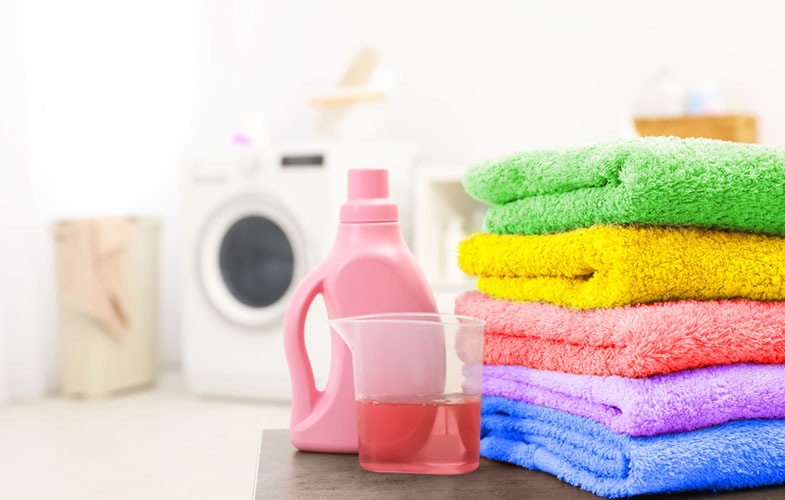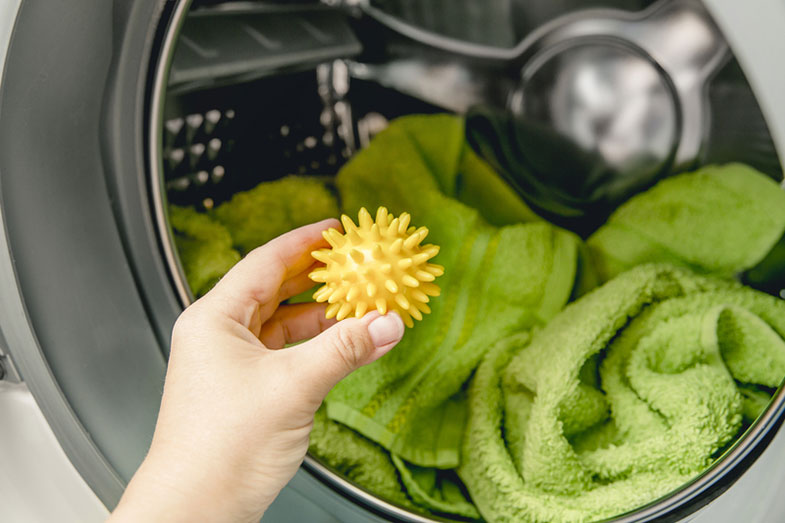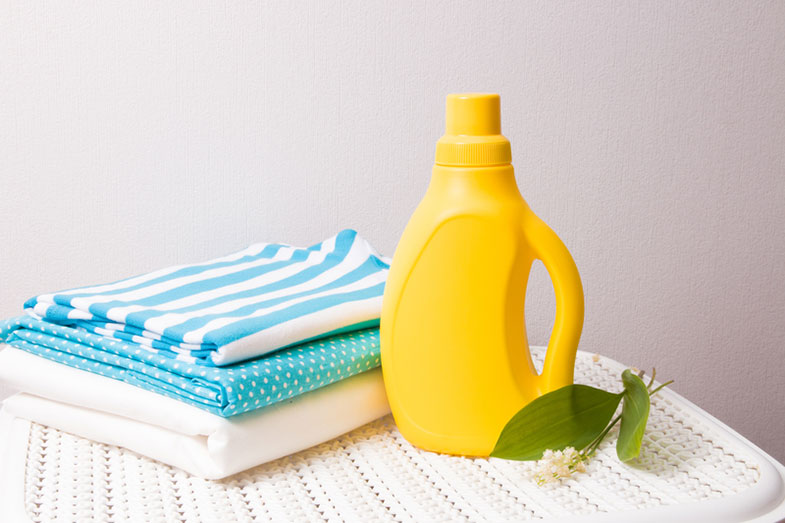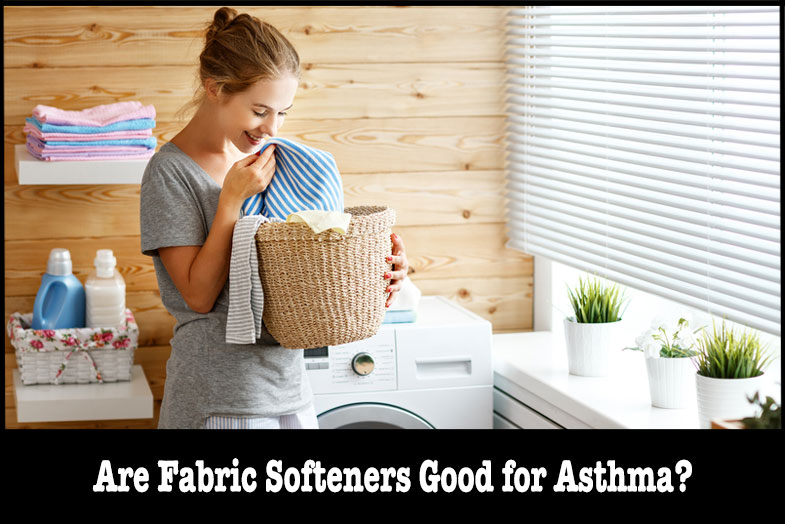What a life would be without fabric softeners, have you ever thought? Rough touching clothes, stretchy, fading, smelly, and full of wrinkles. If you are used to the comfort given by fabric softeners, then you have to compromise with all the features mentioned before.
Fabric softeners are formulated with a number of chemicals that can harm your health. Quats are some compounds added to fabric softeners that are known for triggering asthma.
There are so many health concerns related to fabric softeners. What made you think that it is only benefitting you and not taking from you anything at all?
If you think you cannot wash your clothes without fabric softeners, then this article is for you. People with asthma and other respiratory disorders are requested to read this to the end.
Working of Fabric Softeners

Nowadays, along with detergent, fabric softeners are considered essential while washing clothes. The apparent benefits of fabric softeners attract everyone. They are marketed in such a way that people feel like it is a must-have laundry product.
Marketing agencies indeed garnish the product with so much gold that we couldn’t see its flaws or drawbacks. The same is the case with fabric softeners.
Fabric softeners are capable of coating a layer of chemicals on our clothes, giving it what we say as a “soft” touch. The layer is of slimy chemicals that are termed quats. These chemicals are added to almost all softening products. Other than that, you can also find these chemicals in shampoos. In other words, these are the favorite chemicals of chemical industries.
Problems
Quats
Quats is short for Quaternary Ammonium Compounds. These are the major chemicals in the fabric softener that softens the clothes and leave them with minimum wrinkles. Some examples of quats include dialkyl dimethyl ammonium methyl sulfate, diethyl ester dimethyl ammonium chloride, and distearyldimonium chloride.
If you see the label with any of these ingredients or other terms like cationic surfactant and biodegradable fabric softening agent, then leave that product right there.
This is because quats are the compounds linked very closely to asthma. They trigger asthma in a person and are known to disturb the reproductive system as well. These compounds are so toxic to people with asthma that they are termed “asthmagens”.
Quats not only worsen the situation of people with asthma, but they also develop this disorder in people, especially children. This means that kids are being exposed to unwanted chemicals that can cause their life to become miserable.
Other than that, these chemicals can kill bacteria. This means they have anti-bacterial properties. However, this is of no use since we already get germ-free and clean clothes when we wash them in the detergent. Therefore, the use of these chemicals leads to the development of antibiotic-resistant microorganisms.
Read More: Laundry Detergent: Before or After Clothes?
Preservatives and Colors
Some chemicals in the name of preservatives are added to the fabric softeners to help clothes last longer. These chemicals increase the softness and prevent wear and tear.
Among the chemicals, the most dangerous one is methylisothiazolinone. This compound is an allergen that triggers asthma, skin irritation and can cause several respiratory disorders.
DMDM Hydantoin is another toxic chemical that can be a cause of cancer. This chemical is so toxic that they affect both the internal and external organs of the body. DMDM Hydantoin is majorly responsible for skin irritation and allergies.
The list of chemicals doesn’t end here. There is glutaral that is also added to softeners in the name of preservatives. It is an asthmagen and a skin irritant. This chemical is also very toxic to aquatic life. D&C Violet 2 is yet another chemical that is considered a carcinogen.
Fragrances
The fragrance of fabric softeners and other laundry products that we love to smell are usually of untested hazardous chemicals that can disrupt the normal functioning of hormones in our body.
A study on air contaminants from fragranced consumer goods was made by the University of Washington. In this research, 4 laundry products have been studied. 18 and 20 chemicals in each of those laundry products have been found. The chemical turned out to be extremely bad for humans. One of these chemicals was linalool that causes allergy. Other than that, there were several carcinogens like acetaldehyde and 1,4-dioxane.
Many other detected chemicals are known to cause several respiratory disorders, among which asthma was on the top of the list.
There are some fabric softeners available that are manufactured without fragrances. These softeners will reduce the risk for several disorders, but they still contain quats that are the most harmful chemicals.
Solution
By kicking away fabric softener from your daily routine, you can protect the environment, save money, and save the lives of many people by protecting their health. Irritation of skin, asthma, cancer, and so many deadly diseases are linked to fabric softener.
The amount of destruction that fabric softener causes can be reduced to a good extent if we start using wool dryer balls instead of fabric softener. By making smart choices, we can reduce environmental pollution to a really good extent.
Read More: Soaking Clothes In Detergent: What You Need To Know
What are Dryer Balls?

Dryer balls not only make your clothes soft, but they also save energy. These are round balls of wool that are added to the dryer along with the clothes. They reduce the drying time and soften the clothes. Other than that, these balls make the clothes less wrinkled and make them feel fresh.
Dryer balls are 100% wool. The yarn is wrapped into balls and then washed in a pantyhose so that they don’t get unravel. Dryer balls are usually made using felted wool. It is the same wool that is used to manufacture plastic and rubber.
Why are dryer Balls better than Fabric Softeners?
They are made with zero chemicals, and thus, dryer balls are completely safe for everyone. Fabric softeners, liquid, and dryer sheets contain chemicals that get coat around the clothes. As the chemicals remain in touch with our skin throughout, they can cause several health problems.
Instead of emptying your pockets on those fabric softeners, get yourself these dryer balls. Save energy by reducing the drying and ironing time, and get soft and fresh clothes without any health risk.
As dryer balls reduce the drying time by 15%, you can save a lot of energy. Also, with less wrinkled clothes, you are reducing the ironing time, again saving energy. Since dryer balls are made with zero chemicals, this means no chemicals are mixing up with water and going down the drain. With such a smart approach, you are saving not only yours but aquatic life as well.
Vinegar
A cup of distilled vinegar can be added to the washing machine during the rinse cycle. This makes the clothes super soft. It also causes the detergent to break down. You don’t have to worry about the vinegar smell as it doesn’t linger on garments.
Baking Soda
As soon as you fill the washer with water, add a scoop of baking soda to it. This helps in lowering the pH of the water thus making it soft. This brings out cleaner laundry and makes the cloth soft. It is all-natural, and thus, there is no health risk affiliated with it.
Home Made Fabric Softener

Instead of using an industrially prepared fabric softener, you can prepare the homemade softener with all-natural ingredients. It is made with glycerin that helps with clean fragrance and vinegar that keeps the clothes soft.
You will need:
Essential oil – 20 drops
Vegetable Glycerin – 1 / 8 cup
Water – 2 cups
Vinegar – 2 cups
Directions:
Take vinegar, water, and glycerin in a jar and mix them really well.
Once the ingredients are combined well, add a few drops of essential oil to it. It is completely optional. However, you can use it for a very light scent. Natural ingredients cannot give a strong smell like those obtained from industrial chemicals.
How to use:
Half cup of this softener will be enough for a medium load of clothes. You can add this natural fabric softener to the washer during the last rinse cycle. Simply add it to the softener dispenser.
Note: You can prepare dryer sheets with a similar method. You will need 100% cotton clothes to convert them to dryer sheets.
Don’t use Dryer Sheets.
Skip this product completely. It works similar to fabric softeners by coating the clothes with lots of toxic chemicals. Run the dryer with clothes only. It is important to be safe as we all know prevention is better than cure.
In Conclusion
Fabric softeners have become the most essential laundry product, without which life seems difficult. We keep on using it in our clothes without realizing its adverse effects that majorly affect children.
Fabric softeners and dryer sheets are made with such toxic chemicals that can cause cancer, asthma, and skin irritation in people. A group of chemicals with the name quats are considered asthmagens, and they are really bad for our health.
We can still save ourselves from these chemicals by skipping them totally. There are much better options available that neither affects our lives nor the environment.

